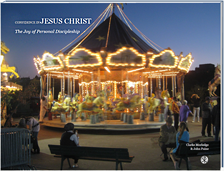2 Corinthians 5:21 is one of most memorable verses in the Bible. In the NIV translation, it reads: “God made him who had no sin to be sin for us, so that in him we might become the righteousness of God.”
But it is also one of the most controversial verses in the Bible. Who knew?!
For Martin Luther, the greatest voice of the Protestant Reformation, 2 Corinthians 5:21 succinctly summarizes the heart of the Gospel message, that a “great exchange” has taken place:
“That is the mystery which is rich in divine grace to sinners: wherein by a wonderful exchange our sins are no longer ours but Christ’s and the righteousness of Christ not Christ’s but ours. He has emptied Himself of His righteousness that He might clothe us with it, and fill us with it. And He has taken our evils upon Himself that He might deliver us from them… in the same manner as He grieved and suffered in our sins, and was confounded, in the same manner we rejoice and glory in His righteousness” (Martin Luther, Werke (Weimar, 1883), 5: 608).
Many Protestant theologians argue that 2 Corinthians 5:21 best articulates the concept of imputation, which describes the mechanics of how the doctrine of justification by faith “works” (no pun intended). To “impute” something in common everyday English usage often has a purely negative connotation, as in “to impute guilt to somebody,” but in Christian theology, there is a lot more going with “imputation.” This theological concept of “imputation” comes from a bank accounting metaphor, as in to “credit” something to someone’s bank account. Essentially, every human being has a debt that we can not pay on our own, because of sin. The good news of the Gospel suggests that Christ has paid that debt by means of a credit to our spiritual banking account.
2 Corinthians 5:21 has what has been described as a “double imputation.” First, it says that Christ who had no sin had sin imputed (or credited) to him, when Jesus died on the cross. Secondly, the work of Christ then results in imputing the righteousness of Christ to the believer. As a result, a believer in Jesus, who is guilty of sin, has the verdict of guilt exchanged with the very righteousness of Christ, a verdict of “paid in full,” something we do not deserve. In other words, because of this “great exchange,” when God looks at a believer in Jesus, God no longer sees our sin, but rather God sees the righteousness of Christ instead. This is the heart of the Gospel message.
However, not everyone agrees that this concept of the imputation of Christ’s righteousness is being taught in 2 Corinthians 5:21. This is “fightin’ words” in some circles as 2 Corinthians 5:21 is often regarded as THE definitive, “go-to” verse teaching the imputation of Christ’s righteousness, more than any other verse in the New Testament. Christians who look to great historical figures of the Reformation, like Martin Luther and John Calvin, cling to this understanding of 2 Cornthians 5:21 as foundational to our understanding of salvation. Others however are convinced there is no concept of imputation to “go-to” in 2 Corinthians 5:21.
Herein lies the focus of the controversy.
Are you ready to rumble??? Reformed theologian Wayne Grudem is: …. (Read on to learn more about the controversy)



